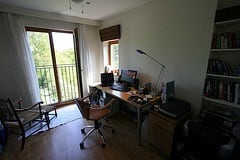With a Virtual Office Midtown Manhattan, solos and small firms can prosper even in a market as cutthroat as New York City.
What is a virtual office?
A virtual office rental is a financial arrangement where solo attorneys and small law firms pay a low monthly fee (typically starting at under $100 a month) to rent the use of a premium commercial address in an executive office suite and the non-exclusive use of office space and amenities, such as conference room facilities, a staffed reception area and access to professional grade internet, telephone, and office equipment.
Attorneys fall into three different categories for virtual offices rentals:
1. Solo attorneys who recently started their own law practice.
Costs to maintain a physical office space can put many in quite a pickle when just starting out as a solo attorney. A virtual office provides a cost effective route to building one’s practice and keeping costs at a minimum. For many solos, a virtual office acts as a figurative bridge to gaining a physical office in the future because it allows one to build their credibility as a solo attorney.

Having that network of like-minded professionals allows attorneys to provide the right answers because they have the expertise provided within the network.
2. The home office solo attorney with a need for a commercial address.
It is quite common for some attorneys to want to work from home. Often this decision is made for lifestyle reasons.
For example, if the attorney has children and wants to be close to home to assist with childcare, or simply, if the attorney wants a commute that is as simple as rolling out of bed to their dining room table.

Also, long-term, at-home attorneys tend to suffer from isolation. This is relative to one’s referral network.
Law is a profession that tends to be best practiced collaboratively. Being able to talk through practice issues with another attorney is critical for the successful practice of law: You tend to get better results for clients and reduce malpractice risk.
Therefore, home based attorneys should look for a virtual office provider exclusive to lawyers, or one that has a high concentration of attorneys. In these options, attorneys should expect management to actively provide opportunities for virtual office attorney to connect with each other, such as regular networking events, access to referral sharing programs, or practice development coordination.
3. Solo attorneys or small firms that are not in the geographic vicinity.
Choosing a virtual office rental as an out-of-town firm is primarily the solution to expanding one’s geographic reach and keeping costs at a minimum.
Take into account a firm based in Los Angeles that is specific to fashion law. New York is not only a legal epicenter, but it is also a fashion capital of the world. Not having a hand in the New York market would limit your firm’s potential indefinitely.
If you can make it here, you can make it anywhere.

Having a Long Island address or even one in an outer borough may not be enough to get the aspirational “Manhattan” client.
Incredibly, a Manhattan office presence may enable the out-of-town firm to charge higher rates, even in the local area.
A virtual office midtown Manhattan rental provides all solo attorneys and small firms with a premium commercial address for their practice, which gives it far greater credibility in the public eye.



on said:
True many small law firms or start-ups use these virtual offices to avoid the cost of setting up a physical office, and some of the companies who wants start their physical office in any city they will start with a virtual office as a test and then come up with physical office if the trial goes well.